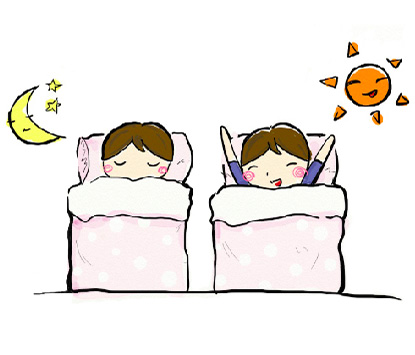ASD and appropriate sleep practice
◅ Sleep tipsInappropriate sleep practice and habits can worsen a child's sleeping problem. It is therefore important to try to eliminate or lessen the amount of inappropriate behaviors that may be preventing the child from getting a good night's sleep. Some of the sleep practices may perpetuate sleep problems in children with Autism Spectrum Disorder (ASD), such as napping during the day or co-sleeping.
What are some appropriate sleep practices?
1. Having a regular bedtime routine is important for children with ASD.
To maintain structured bed times in these children, visual support could be helpful. Visual support is a tool that is used to facilitate the child's understanding of environmental expectations. It can be beneficial in a way that it makes an abstract concept (i.e. bed time schedule) more concrete for the child, hence improving his/her attention to and understanding of the concept.


2. Ensure a comfortable sleeping environment
Some children with ASD are particularly sensitive to sensory stimuli, therefore noise disturbance, light, overcrowding and extreme temperatures are a few things that may disturb their sleep or influence sleep onset. Light acts as a cue that triggers chemical events in the brain to regulate sleep – when night time is near and the amount of sunlight in our environment decreases, melatonin in the brain increases, which is a hormone that promotes sleep.
Therefore, it is advised to keep the child’s room bright in the daytime and dark during the night. To provide a comfortable, distraction-free environment for the child, keep his/her room at an appropriate temperature and keep the house quiet during the night.

3. Comfortable pyjamas and bed sheets
Furthermore, since some children with ASD are particularly sensitive to somatic stimulants, they may be affected by certain textiles. These include (but are not limited to) pyjamas, bed sheets, blanket or diaper. These should be adapted to suit the child so they are less stimulated during sleep.

4. Medication usagae
Another particularly relevant behaviour to consider is medication usage which has been found to be related to sleeping problems in children with ASD. These medications (e.g. stimulants, antipsychotics) may interfere with the child's natural biological clock or cause arousal and disturb sleep. If the medication is causing great negative impacts on the child's sleep, consult your doctor to discuss any adjustment of the type and dosage of medication.

5. Parental sleep-wake pattern
Also, a study has found that a child’s sleep is affected by parent’s sleep-wake patterns (especially mother’s). Therefore, to improve your child’s sleep, set a good example for your child by maintaining regular habits.
Reference:
- Yu, X. T., Lam, H. S., Au, C. T., Chan, S. H. Y., Chan, D. F. Y., & Li, A. M. (2015). Extended Parent-based Behavioural Education Improves Sleep in Children with Autism Spectrum Disorder. HK J Paediatr (New Series), 20(4), 219-225.
